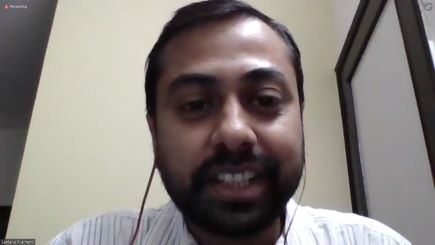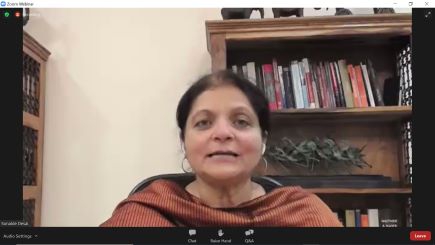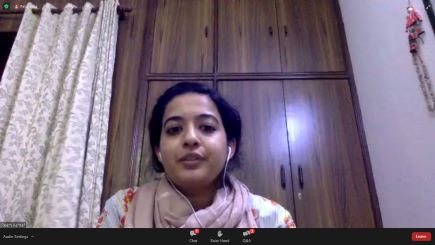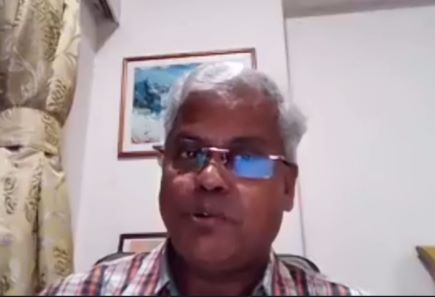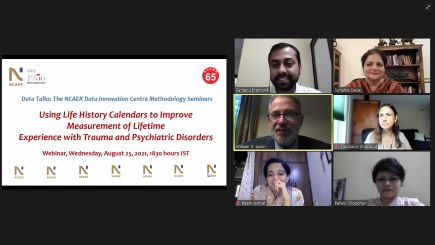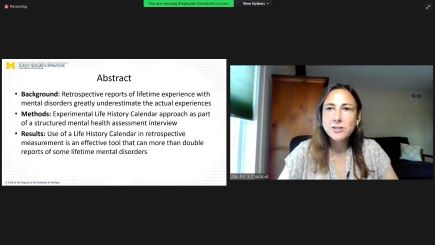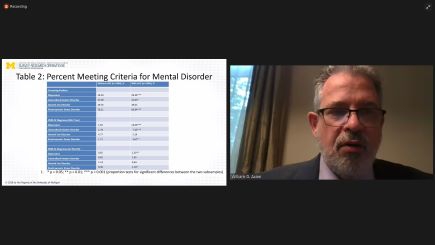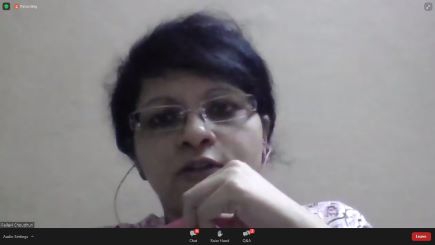Using Life History Calendars to Improve Measurement of Lifetime Experience with
Trauma and Psychiatric Disorders
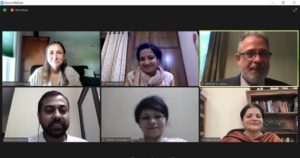 The third webinar in the NCAER Seminar series on Data Collection Methodology was organised by the NCAER National Data Innovation Centre on August 25, 2021. The webinar is part of a series of thought-provoking discussions on research methodologies in which distinguished speakers in the field share their views and one or more discussants reflect on them from an Indian perspective. The first seminar in this series held in March was presented by Stanley Presser, Distinguished University Professor at the University of Maryland while the second seminar hosted in the month of June was delivered by Frauke Kreuter, Professor of Statistics and Data Science for the Social Sciences and Humanities at the Ludwig-Maximilians-University of Munich (Germany) and Professor at the Joint Program in Survey Methodology at the University of Maryland.
The third webinar in the NCAER Seminar series on Data Collection Methodology was organised by the NCAER National Data Innovation Centre on August 25, 2021. The webinar is part of a series of thought-provoking discussions on research methodologies in which distinguished speakers in the field share their views and one or more discussants reflect on them from an Indian perspective. The first seminar in this series held in March was presented by Stanley Presser, Distinguished University Professor at the University of Maryland while the second seminar hosted in the month of June was delivered by Frauke Kreuter, Professor of Statistics and Data Science for the Social Sciences and Humanities at the Ludwig-Maximilians-University of Munich (Germany) and Professor at the Joint Program in Survey Methodology at the University of Maryland.
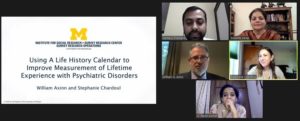 In this third webinar NCAER-NDIC hosted William G. Axinn, Professor of Survey Research, Population Studies at the University of Michigan, and Stephanie Chardoul, Director of Survey Research Operations (SRO) at the University of Michigan. P. Arokiasamy, retired Professor at the International Institute for Population Sciences was the discussant for the talk. It was held virtually.
In this third webinar NCAER-NDIC hosted William G. Axinn, Professor of Survey Research, Population Studies at the University of Michigan, and Stephanie Chardoul, Director of Survey Research Operations (SRO) at the University of Michigan. P. Arokiasamy, retired Professor at the International Institute for Population Sciences was the discussant for the talk. It was held virtually.
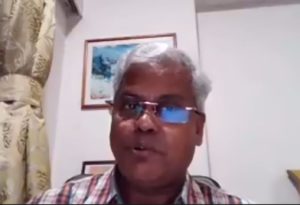 Accurate lifetime measurement of the general population’s experience with health disorders poses a significant challenge. However, these lifetime measures are crucially important to establish population prevalence and to enable population-level research. The study presented in this webinar focuses on psychiatric disorders, specifically alcohol use disorder (AUD), major depressive disorder (MDD), generalised anxiety disorder (GAD), and post-traumatic stress disorder (PTSD), and uses life history calendars (LHCs) to dramatically improve lifetime measures of these disorders. It features a large-scale general population experiment using WHO’s Composite International Diagnostic Interview (CIDI) to measure AUD, MDD, GAD, and PTSD. Respondents for this study were randomly assigned to receive an integrated LHC and CIDI interview and a CIDI interview with no LHC. The study brings forth that the careful use of the LHC increases rates of both screening and diagnosis for the disorders, and produces greater reporting of exposure to potentially traumatic experiences. The LHC also produces accurate reports of age of onset, which is valuable for analyses of causes, consequences, and service needs related to mental health.
Accurate lifetime measurement of the general population’s experience with health disorders poses a significant challenge. However, these lifetime measures are crucially important to establish population prevalence and to enable population-level research. The study presented in this webinar focuses on psychiatric disorders, specifically alcohol use disorder (AUD), major depressive disorder (MDD), generalised anxiety disorder (GAD), and post-traumatic stress disorder (PTSD), and uses life history calendars (LHCs) to dramatically improve lifetime measures of these disorders. It features a large-scale general population experiment using WHO’s Composite International Diagnostic Interview (CIDI) to measure AUD, MDD, GAD, and PTSD. Respondents for this study were randomly assigned to receive an integrated LHC and CIDI interview and a CIDI interview with no LHC. The study brings forth that the careful use of the LHC increases rates of both screening and diagnosis for the disorders, and produces greater reporting of exposure to potentially traumatic experiences. The LHC also produces accurate reports of age of onset, which is valuable for analyses of causes, consequences, and service needs related to mental health.
 William G. Axinn is Professor of survey research, population studies, sociology and public policy at the University of Michigan. Axinn is a social demographer studying community, intergenerational, and social psychological influences on marriage, childbearing, reproductive health, mental health and the natural environment. He is director of the Chitwan Valley Family Study (CVFS), a 25-year, mixed method, whole-family longitudinal study in Nepal. He is also co-investigator on multiple different data collection projects related to family change and reproductive health in the US
William G. Axinn is Professor of survey research, population studies, sociology and public policy at the University of Michigan. Axinn is a social demographer studying community, intergenerational, and social psychological influences on marriage, childbearing, reproductive health, mental health and the natural environment. He is director of the Chitwan Valley Family Study (CVFS), a 25-year, mixed method, whole-family longitudinal study in Nepal. He is also co-investigator on multiple different data collection projects related to family change and reproductive health in the US
 Stephanie Chardoul is the Director of Survey Research Operations (SRO) at the University of Michigan’s Survey Research Center (SRC). During her tenure at SRC, she has been the Manager of the Survey Services Laboratory (telephone facility), Senior Survey Director, Director of the Project Design and Management Group, and Director of Proposals. Her substantive interests include cross-cultural survey methods, building survey research infrastructure, and mental health. Stephanie has been a member of the Data Collection Coordinating Centre for the long-running World Mental Health Survey Initiative, and is the Director of the WHO Composite International Diagnostic Interview (CIDI) Training Centre.
Stephanie Chardoul is the Director of Survey Research Operations (SRO) at the University of Michigan’s Survey Research Center (SRC). During her tenure at SRC, she has been the Manager of the Survey Services Laboratory (telephone facility), Senior Survey Director, Director of the Project Design and Management Group, and Director of Proposals. Her substantive interests include cross-cultural survey methods, building survey research infrastructure, and mental health. Stephanie has been a member of the Data Collection Coordinating Centre for the long-running World Mental Health Survey Initiative, and is the Director of the WHO Composite International Diagnostic Interview (CIDI) Training Centre.
 Perianayagam Arokiasamy served as faculty for over three decades at the International Institute for Population Sciences, Mumbai. His subject areas of teaching and research expertise cover demography, public health, ageing and global health, development studies and large-scale health survey research. As the lead Principal Investigator, he directed several surveys and research studies including LASI Wave 1, SAGE India wave 1, 2, and 3, WHO-World Health Survey, NFHS-3 (2004-09).
Perianayagam Arokiasamy served as faculty for over three decades at the International Institute for Population Sciences, Mumbai. His subject areas of teaching and research expertise cover demography, public health, ageing and global health, development studies and large-scale health survey research. As the lead Principal Investigator, he directed several surveys and research studies including LASI Wave 1, SAGE India wave 1, 2, and 3, WHO-World Health Survey, NFHS-3 (2004-09).






 The third webinar in the NCAER Seminar series on Data Collection Methodology was organised by the NCAER National Data Innovation Centre on August 25, 2021. The webinar is part of a series of thought-provoking discussions on research methodologies in which distinguished speakers in the field share their views and one or more discussants reflect on them from an Indian perspective. The
The third webinar in the NCAER Seminar series on Data Collection Methodology was organised by the NCAER National Data Innovation Centre on August 25, 2021. The webinar is part of a series of thought-provoking discussions on research methodologies in which distinguished speakers in the field share their views and one or more discussants reflect on them from an Indian perspective. The  In this third webinar NCAER-NDIC hosted William G. Axinn, Professor of Survey Research, Population Studies at the University of Michigan, and Stephanie Chardoul, Director of Survey Research Operations (SRO) at the University of Michigan. P. Arokiasamy, retired Professor at the International Institute for Population Sciences was the discussant for the talk. It was held virtually.
In this third webinar NCAER-NDIC hosted William G. Axinn, Professor of Survey Research, Population Studies at the University of Michigan, and Stephanie Chardoul, Director of Survey Research Operations (SRO) at the University of Michigan. P. Arokiasamy, retired Professor at the International Institute for Population Sciences was the discussant for the talk. It was held virtually. Accurate lifetime measurement of the general population’s experience with health disorders poses a significant challenge. However, these lifetime measures are crucially important to establish population prevalence and to enable population-level research. The study presented in this webinar focuses on psychiatric disorders, specifically alcohol use disorder (AUD), major depressive disorder (MDD), generalised anxiety disorder (GAD), and post-traumatic stress disorder (PTSD), and uses life history calendars (LHCs) to dramatically improve lifetime measures of these disorders. It features a large-scale general population experiment using WHO’s Composite International Diagnostic Interview (CIDI) to measure AUD, MDD, GAD, and PTSD. Respondents for this study were randomly assigned to receive an integrated LHC and CIDI interview and a CIDI interview with no LHC. The study brings forth that the careful use of the LHC increases rates of both screening and diagnosis for the disorders, and produces greater reporting of exposure to potentially traumatic experiences. The LHC also produces accurate reports of age of onset, which is valuable for analyses of causes, consequences, and service needs related to mental health.
Accurate lifetime measurement of the general population’s experience with health disorders poses a significant challenge. However, these lifetime measures are crucially important to establish population prevalence and to enable population-level research. The study presented in this webinar focuses on psychiatric disorders, specifically alcohol use disorder (AUD), major depressive disorder (MDD), generalised anxiety disorder (GAD), and post-traumatic stress disorder (PTSD), and uses life history calendars (LHCs) to dramatically improve lifetime measures of these disorders. It features a large-scale general population experiment using WHO’s Composite International Diagnostic Interview (CIDI) to measure AUD, MDD, GAD, and PTSD. Respondents for this study were randomly assigned to receive an integrated LHC and CIDI interview and a CIDI interview with no LHC. The study brings forth that the careful use of the LHC increases rates of both screening and diagnosis for the disorders, and produces greater reporting of exposure to potentially traumatic experiences. The LHC also produces accurate reports of age of onset, which is valuable for analyses of causes, consequences, and service needs related to mental health. William G. Axinn is Professor of survey research, population studies, sociology and public policy at the University of Michigan. Axinn is a social demographer studying community, intergenerational, and social psychological influences on marriage, childbearing, reproductive health, mental health and the natural environment. He is director of the Chitwan Valley Family Study (CVFS), a 25-year, mixed method, whole-family longitudinal study in Nepal. He is also co-investigator on multiple different data collection projects related to family change and reproductive health in the US
William G. Axinn is Professor of survey research, population studies, sociology and public policy at the University of Michigan. Axinn is a social demographer studying community, intergenerational, and social psychological influences on marriage, childbearing, reproductive health, mental health and the natural environment. He is director of the Chitwan Valley Family Study (CVFS), a 25-year, mixed method, whole-family longitudinal study in Nepal. He is also co-investigator on multiple different data collection projects related to family change and reproductive health in the US Stephanie Chardoul is the Director of Survey Research Operations (SRO) at the University of Michigan’s Survey Research Center (SRC). During her tenure at SRC, she has been the Manager of the Survey Services Laboratory (telephone facility), Senior Survey Director, Director of the Project Design and Management Group, and Director of Proposals. Her substantive interests include cross-cultural survey methods, building survey research infrastructure, and mental health. Stephanie has been a member of the Data Collection Coordinating Centre for the long-running World Mental Health Survey Initiative, and is the Director of the WHO Composite International Diagnostic Interview (CIDI) Training Centre.
Stephanie Chardoul is the Director of Survey Research Operations (SRO) at the University of Michigan’s Survey Research Center (SRC). During her tenure at SRC, she has been the Manager of the Survey Services Laboratory (telephone facility), Senior Survey Director, Director of the Project Design and Management Group, and Director of Proposals. Her substantive interests include cross-cultural survey methods, building survey research infrastructure, and mental health. Stephanie has been a member of the Data Collection Coordinating Centre for the long-running World Mental Health Survey Initiative, and is the Director of the WHO Composite International Diagnostic Interview (CIDI) Training Centre. Perianayagam Arokiasamy served as faculty for over three decades at the International Institute for Population Sciences, Mumbai. His subject areas of teaching and research expertise cover demography, public health, ageing and global health, development studies and large-scale health survey research. As the lead Principal Investigator, he directed several surveys and research studies including LASI Wave 1, SAGE India wave 1, 2, and 3, WHO-World Health Survey, NFHS-3 (2004-09).
Perianayagam Arokiasamy served as faculty for over three decades at the International Institute for Population Sciences, Mumbai. His subject areas of teaching and research expertise cover demography, public health, ageing and global health, development studies and large-scale health survey research. As the lead Principal Investigator, he directed several surveys and research studies including LASI Wave 1, SAGE India wave 1, 2, and 3, WHO-World Health Survey, NFHS-3 (2004-09).